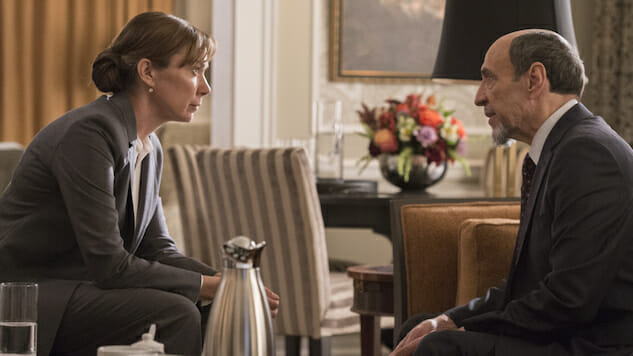Homeland: A Monster of Our Own Making
(Episode 6.03)
JoJo Whilden/SHOWTIME
When his short stay in an Israeli settlement spurs an argument with a friend, Saul Berenson (Mandy Patinkin) frames his case in terms of politics, not religion: “How can you love making enemies?” he challenges her. “How can you love knowing that your very presence here makes peace less possible?” In an episode called “The Covenant,” with its connotation of the sacred bond between God and His chosen people, Saul’s turn toward the secular is telling, as if to suggest that the relationship between citizens and their government is consecrated, too.
As Homeland deepens the conflicts that will shape its sixth season—as Quinn (Rupert Friend) fights his paranoia; as Carrie (Claire Danes) fights to free Sekou (J. Mallory McCree); as President-elect Keane (Elizabeth Marvel) fights the hawkishness of Dar Adal (F. Murray Abraham)—its unifying feature thus far is its increasingly explicit criticism of actions masquerading as “security” that in fact make us far less safe. As Saul says to Dar of Iran’s shadow nuclear program, the consequences of leadership by diktat and propaganda are dire indeed: “The last time we were wrong about WMDs, it turned into a national nightmare.”
It’s fitting, perhaps, that this week’s Homeland—which is, in essence, a leery glimpse into the gears of the post-9/11 “security” state—should air amid the implementation of the White House’s flagrantly un-American executive order on immigration and the ferocious, rousing public outcry against it: We’ve reached the logical next step in 15-plus years of authoritarian impulses, impulses to which the series itself has occasionally succumbed, and find ourselves recoiling at what we’ve wrought. As the FBI’s Ray Conlin (Dominic Fumusa) tells Carrie when she inquires, somewhat daftly, when we started arrested people for crimes they might commit, “Somewhere between 9/11 and Orlando.”
-

-

-

-

-

-

-

-

-

-

-

-

-

-

-

-

-

-

-

-

-

-

-

-

-

-

-

-

-

-

-

-

-

-

-

-

-

-

-

-








































